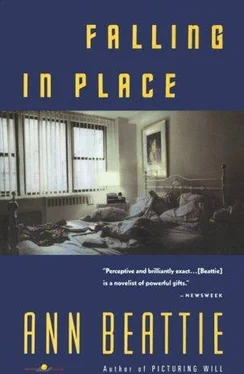Ann Beattie - Falling in Place
Здесь есть возможность читать онлайн «Ann Beattie - Falling in Place» весь текст электронной книги совершенно бесплатно (целиком полную версию без сокращений). В некоторых случаях можно слушать аудио, скачать через торрент в формате fb2 и присутствует краткое содержание. Год выпуска: 1991, Издательство: Vintage, Жанр: Современная проза, на английском языке. Описание произведения, (предисловие) а так же отзывы посетителей доступны на портале библиотеки ЛибКат.
- Название:Falling in Place
- Автор:
- Издательство:Vintage
- Жанр:
- Год:1991
- ISBN:нет данных
- Рейтинг книги:4 / 5. Голосов: 1
-
Избранное:Добавить в избранное
- Отзывы:
-
Ваша оценка:
- 80
- 1
- 2
- 3
- 4
- 5
Falling in Place: краткое содержание, описание и аннотация
Предлагаем к чтению аннотацию, описание, краткое содержание или предисловие (зависит от того, что написал сам автор книги «Falling in Place»). Если вы не нашли необходимую информацию о книге — напишите в комментариях, мы постараемся отыскать её.
Falling in Place — читать онлайн бесплатно полную книгу (весь текст) целиком
Ниже представлен текст книги, разбитый по страницам. Система сохранения места последней прочитанной страницы, позволяет с удобством читать онлайн бесплатно книгу «Falling in Place», без необходимости каждый раз заново искать на чём Вы остановились. Поставьте закладку, и сможете в любой момент перейти на страницу, на которой закончили чтение.
Интервал:
Закладка:
Bobby held up his foot. He had a huge foot, and he was wearing bright-orange running shoes with a white stripe curving around the side. “Can’t wear these to teach in,” Bobby said. “Got to get shoes. What else is there to buy besides cowboy boots for shoes? Some goddamn old man’s shoes that lace up? Jesus, do I hate to think about teaching.”
“When does the semester—” she said.
“Hey!” Bobby said, before she finished her sentence. “Excuse me for breaking in, but when I think of something, if I don’t say it, I lose it.” He took off his glasses, blew on them, wiped them on the tail of his shirt. “I forgot what I was going to say,” he said.
“Were you going to say something about teaching?”
“Oh,” he said. “Right. Right. I was going to ask you about Yale. You said you’re at Yale.”
“I don’t even want to think about it. I just want a vacation. All I want is a rest, and for this heat wave to break.”
“Where did I say that bookstore was?” Bobby said.
“Broadway and 95th.”
“God!” Bobby said. “If you hadn’t remembered, I would have lost it just like that.”
He snapped his fingers. They didn’t make any sound, because his hands were wet. He was drinking beer, and the can was sweating. Bobby kept wiping his hand on his denim shorts. “What are they going to do, come into my classroom and carry me out? What am I buying shoes for, and wearing slacks with a crease down the front? These are my shoes, you know?”
Bobby held up his big puffy orange foot. “Do you have a piece of paper?” he said. “If I don’t write down that address, I’ll get there and I’ll never remember it.”
She watched him print: B’way
95th cowboy
shirt bagels
When Bobby wrote, he bent his head and put his eye down close to the page, the way a young child writes, having to concentrate both on the idea and on the handwriting. Bobby’s handwriting was just about illegible. Three typists who had been given his novel had quit. When he wanted to be sure to understand his writing himself, he printed. He explained all this to her as he continued the message to himself: “Kathryn and Daphne?”
“Just had an idea,” Bobby said. He put the top back on the pen. He put the pen in his pocket, realized it was hers, took it out and put it on the table. A little blue card fell out with the pen. The blue card said: “Zut alors!” Bobby looked embarrassed. He turned the card over; it was a foreign language flash card. She read, in English, “My goodness!”
“My pockets,” Bobby sighed, pulling a wad of papers out of his shirt pocket. He spread the things out over the table. There was a fake twenty-dollar bill that he said his nephew had given him, a folded piece of yellow paper that turned out to be a receipt from the dry cleaner’s (“The shirt!” Bobby said, pointing to a line of writing. “I’ve found my shirt!”), a thin pocket calculator, a gum wrapper, several index cards with notes for poems on them, a photo-booth picture, one of three, that he kept meaning to send his sister for her locket (not his idea, she wanted the thing), and a dried leaf that he wanted to try to find out about. She didn’t know what it was. “What do you think?” he said. “Is this a common leaf?”
“What did you do with the other pictures?” she said.
“I gave them to women,” he said. “They were profile shots. I look better in profile.” He examined his running shoes. “Don’t want to go running, do you?” he said.
“It’s too hot.”
“Maybe later,” he said.
“Maybe,” she said.
“You really wouldn’t mind if I slept on the sofa tonight? I don’t like to drive into New York at night. I would like a bagel, though. Maybe later we can go out and find a bagel.” He finished his beer and bent the can in half. He took it to the kitchen and threw it away, opened the refrigerator and took out another one. It was Coors beer. He had brought a six-pack with him.
“Tell me about your job,” he said. “How does that work?”
“How does it work?” she said, amused that he had put it that way. “Well — I get up in the morning and drive to the high school and go into the classroom, where eager, bright students await me: eager to go home and blast any ideas out of their heads with rock music. Some of them try to appear even more ignorant than they are, though, so maybe they’re brighter than they seem.” She took a sip of his beer. “Anyway,” she said, “they don’t know anything, and they won’t when the summer is over, either. The administration’s idea of education is a real kick: You have them read parts of books and plays, and you show them movies and play them records, and you have them enact little scenes. I’d like to give them The Story of O and let them enact some scenes.”
“The Story of O ,” Bobby said. “That used to be one of Spangle’s favorite books.”
“You’re kidding,” she said. “When?”
“Up at his old house in Vermont. I went up there last summer with a lady love. I was nostalgic for the place. Some Indian was living there, growing corn. I’m not kidding: some guy in a serapé—my lady love said it was a beach towel; she swore it was — with his hair in a braid, dark-skinned guy, a hippie, I guess a hippie dressed up like an Indian, and he was out there picking corn when we pulled up. I was going to say I used to live there and ask if we could walk around, but the guy looked pretty flipped out, and he had a doberman tied to one of the poles that held up the clothesline, and it looked like it was just tied up with twine. The stuff you wrap packages with. Nothing more than that. He’d painted the shutters red, too, and I was sure the place was going to look lousy inside, so I put it in reverse and took off. What is it about Vermont, do you think? What’s the story on that?”
“Isn’t it the same in New Hampshire?”
“No,” he said. He took one of the blue index cards out of his pocket, bent his head and wrote a few words down. He put the index card back in his pocket.
“I don’t know. I’ve never thought about it.”
“You should get him to take you there and show you the place. Maybe it would depress him, though. He did a lot of work inside that house.”
“Did you know his girlfriend?”
“The one that had part of her stomach removed, or the other one?”
“The other one, I guess. At least, he never told me that she was operated on.”
“Yeah. I knew that one. I didn’t know the one who lost her stomach.”
Bobby was rolling a joint. He rolled it, looked at it, put it on the table. “You want a report on his flyaway ladybug,” he said. “I don’t know. We only overlapped by a week — she came, I went. Pretty. Scrawny. Smart. Left, finally, to go to New York. We went to see her there one night after our dealer got shot in a parking lot in Brattleboro, because Spangle knew she knew somebody in New York. I think she was going to school in New York, and I think Spangle had given her a little bread when she split. Anyway, this guy Horton came over. Somebody she and Spangle had known at Bard. That’s right — she wasn’t going to school in New York, she’d been at Bard with Spangle. I don’t know what she was doing in New York. She lived on Columbus Avenue. Now I’m starting to remember. She hadn’t been there long, and she was painting the walls white the night we went over, and Horton was fucking around, writing stuff on the wall in white paint before she painted it, stuff about… Jesus — this comes back to me: He kept telling what he called Italian-Mormon jokes, about the Angel Tortoni. He was scribbling away on the wall, and it was hard as hell to get his attention. All we wanted was grass.” Bobby smiled. “It’s funny now. It wasn’t funny then. I thought anybody that bizarro had to be a narc.” He lit the joint, inhaled, handed it to her. She waved it away. He stubbed it out. He sat silently, waited, exhaled slowly. “She still had her high school yearbook. Under their pictures they all had their favorite saying, and then it predicted what would become of them. I don’t remember what the prediction was for her. I just remember the first line of Blake’s sunflower poem under her name. Odd.” Bobby examined the extinguished cigarette. “I was a lifeguard,” he said. “Splash splash.”
Читать дальшеИнтервал:
Закладка:
Похожие книги на «Falling in Place»
Представляем Вашему вниманию похожие книги на «Falling in Place» списком для выбора. Мы отобрали схожую по названию и смыслу литературу в надежде предоставить читателям больше вариантов отыскать новые, интересные, ещё непрочитанные произведения.
Обсуждение, отзывы о книге «Falling in Place» и просто собственные мнения читателей. Оставьте ваши комментарии, напишите, что Вы думаете о произведении, его смысле или главных героях. Укажите что конкретно понравилось, а что нет, и почему Вы так считаете.












